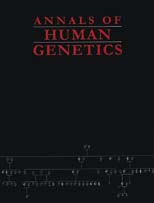Crossref Citations
This article has been cited by the following publications. This list is generated based on data provided by
Crossref.
Canto, Patricia
de la Chesnaye, Elsa
López, Marisol
Cervantes, Alicia
Chávez, Bertha
Vilchis, Felipe
Reyes, Edgardo
Ulloa-Aguirre, Alfredo
Kofman-Alfaro, Susana
and
Méndez, Juan Pablo
2000.
A Mutation in the 5′ Non-High Mobility Group Box Region of the SRY Gene in Patients with Turner Syndrome and Y Mosaicism*.
The Journal of Clinical Endocrinology & Metabolism,
Vol. 85,
Issue. 5,
p.
1908.
Wolff, Daynna J.
2000.
Advances in laboratory evaluation of turner syndrome and its variants : Beyond cytogenetics studies.
The Indian Journal of Pediatrics,
Vol. 67,
Issue. 11,
p.
825.
Conway, Gerard S.
2002.
The impact and management of Turner's syndrome in adult life.
Best Practice & Research Clinical Endocrinology & Metabolism,
Vol. 16,
Issue. 2,
p.
243.
Nishi, Mirian Y.
Domenice, Sorahia
Medeiros, Maria Aparecida
Mendonca, Berenice B.
and
Billerbeck, Ana Elisa C.
2002.
Detection of Y‐specific sequences in 122 patients with Turner syndrome: Nested PCR is not a reliable method.
American Journal of Medical Genetics,
Vol. 107,
Issue. 4,
p.
299.
Elsheikh, M.
Dunger, D. B.
Conway, G. S.
and
Wass, J. A. H.
2002.
Turner’s Syndrome in Adulthood.
Endocrine Reviews,
Vol. 23,
Issue. 1,
p.
120.
Pelotti, S.
Bini, C.
Ceccardi, S.
Ferri, G.
Abbondanza, A.
Greggio, N. A.
Ponzano, E.
and
Caenazzo, L.
2003.
Sex Chromosome Analysis in Turner Syndrome by a Pentaplex PCR Assay.
Genetic Testing,
Vol. 7,
Issue. 3,
p.
245.
Quilter, Claire R
Svennevik, Elizabeth C
Serhal, Paul
Ralph, David
Bahadur, Gulam
Stanhope, Richard
Sütterlin, Marc
Delhanty, Joy D.A
and
Taylor, Kay E
2003.
Cytogenetic and Y chromosome microdeletion screening of a random group of infertile males.
Fertility and Sterility,
Vol. 79,
Issue. 2,
p.
301.
Canto, Patricia
Kofman-Alfaro, Susana
Jiménez, Ana Luisa
Söderlund, Daniela
Barrón, Consuelo
Reyes, Edgardo
Méndez, Juan Pablo
and
Zenteno, Juan Carlos
2004.
Gonadoblastoma in Turner syndrome patients with nonmosaic 45,X karyotype and Y chromosome sequences.
Cancer Genetics and Cytogenetics,
Vol. 150,
Issue. 1,
p.
70.
Cavalli, Pietro
Riboli, Barbara
Torresani, Paola
and
Poggiani, Carlo
2006.
Prenatal diagnosis of X chromosome monosomy.
Prenatal Diagnosis,
Vol. 26,
Issue. 10,
p.
992.
Kim, Hye Ran
Shin, Jeong Hwan
Jung, Woo Yeong
and
Lee, Jeong Nyeo
2006.
Identification of Y-chromosome by Molecular Analysis in Patients with Turner Syndrome.
Annals of Laboratory Medicine,
Vol. 26,
Issue. 2,
p.
131.
Bianco, B.
Lipay, M.V.N.
Melaragno, M.I.
Guedes, A.D.
and
Verreschi, I.T.N.
2006.
Detection of Hidden Y Mosaicism in Turner's Syndrome: Importance in the Prevention of Gonadoblastoma.
Journal of Pediatric Endocrinology and Metabolism,
Vol. 19,
Issue. 9,
Cortés-Gutiérrez, Elva I
Dávila-Rodríguez, Martha I
Vargas-Villarreal, Javier
and
Cerda-Flores, Ricardo M
2007.
Prevalence of chromosomal aberrations in Mexican women with primary amenorrhoea.
Reproductive BioMedicine Online,
Vol. 15,
Issue. 4,
p.
463.
Lungeanu, A
Arghir, A
Arps, S
Cardos, G
Dumitriu, N
Budisteanu, M
Chirieac, S
and
Rodewald, A
2008.
Chromosome Y Isodicentrics in two Cases with Ambiguous genitalia and Features of Turner Syndrome.
Balkan Journal of Medical Genetics,
Vol. 11,
Issue. 2,
p.
51.
Guedes, Alexis D.
Bianco, Bianca
Callou, Emmanuela Q.
Gomes, Ana Luíza
Lipay, Mônica V. N.
and
Verreschi, Ieda T. N.
2008.
O hormônio de crescimento na síndrome de Turner: dados e reflexões.
Arquivos Brasileiros de Endocrinologia & Metabologia,
Vol. 52,
Issue. 5,
p.
757.
Araújo, Claudinéia
Galera, Marcial F.
Galera, Bianca B.
Silvestre, Flávia G.
and
Medeiros, Sebastião F.
2008.
Molecular identification of chromosome Y sequences in Brazilian patients with Turner syndrome.
Gynecological Endocrinology,
Vol. 24,
Issue. 12,
p.
713.
Oliveira, Rose Mary Rocco de
Verreschi, Ieda Therezinha do Nascimento
Lipay, Monica Vannucci Nunes
Eça, Lilian Piñero
Guedes, Alexis Dourado
and
Bianco, Bianca
2009.
Y chromosome in Turner syndrome: review of the literature.
Sao Paulo Medical Journal,
Vol. 127,
Issue. 6,
p.
373.
Sallai, Á.
Sólyom, J.
Dobos, M.
Szabó, J.
Halász, Z.
Ságodi, L.
Niederland, T.
Kozári, A.
Bertalan, R.
Ugocsai, P.
and
Fekete, G.
2010.
Y-chromosome markers in Turner syndrome: Screening of 130 patients.
Journal of Endocrinological Investigation,
Vol. 33,
Issue. 4,
p.
222.
Maher, Eamonn R
2013.
Emery and Rimoin's Principles and Practice of Medical Genetics.
p.
1.
Kalantari, Hamid
Asia, Saba
Totonchi, Mehdi
Vazirinasab, Hamed
Mansouri, Zahra
Zarei Moradi, Shabnam
Haratian, Kaveh
Gourabi, Hamid
and
Mohseni Meybodi, Anahita
2014.
Delineating the association between isodicentric chromosome Y and infertility: a retrospective study.
Fertility and Sterility,
Vol. 101,
Issue. 4,
p.
1091.
Nistal, Manuel
Paniagua, Ricardo
González-Peramato, Pilar
and
Reyes-Múgica, Miguel
2015.
Perspectives in Pediatric Pathology, Chapter 5. Gonadal Dysgenesis.
Pediatric and Developmental Pathology,
Vol. 18,
Issue. 4,
p.
259.




